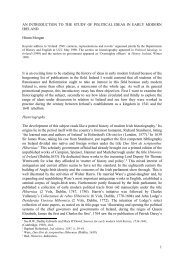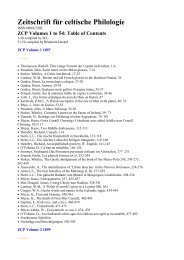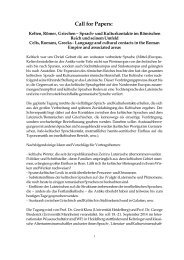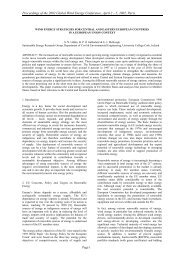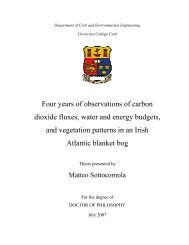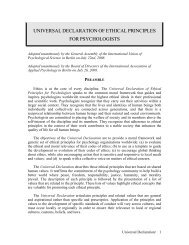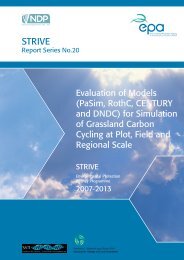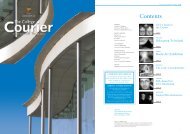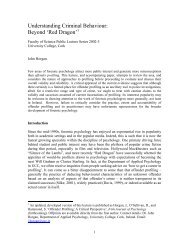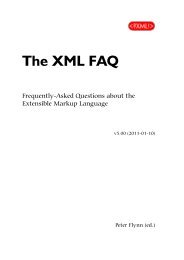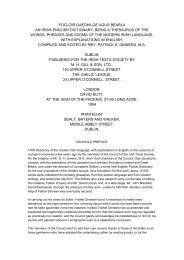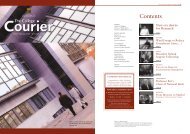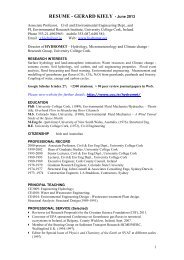PResident's RePORt 2009/2010 - University College Cork
PResident's RePORt 2009/2010 - University College Cork
PResident's RePORt 2009/2010 - University College Cork
You also want an ePaper? Increase the reach of your titles
YUMPU automatically turns print PDFs into web optimized ePapers that Google loves.
Foreword<br />
UCC at a Glance<br />
Academic Developments<br />
Teaching and Learning<br />
Research<br />
<strong>College</strong> Reports:<br />
Arts, Celtic<br />
Studies and Social<br />
Sciences<br />
Business and Law<br />
Medicine and Health<br />
Science, Engineering and<br />
Food Science<br />
Events<br />
Student Experience<br />
Sports and Recreation<br />
Buildings and Estates<br />
<strong>Cork</strong> <strong>University</strong> Press<br />
Finance<br />
Governing Body<br />
IRIS Appendix<br />
51<br />
of EIROSHELLTM a new chromatographic technology. Both<br />
work in the Department of Chemistry and the SFI-sponsored,<br />
Irish Separation Science Cluster.<br />
• Professor John Sodeau was appointed as Interdisciplinary<br />
Professor at Tokyo Institute of Technology, Japan for <strong>2009</strong>/<strong>2010</strong>.<br />
His duties included setting up a distance learning course on<br />
Atmospheric Chemistry for graduate students<br />
• Dr Dara Fitzpatrick was nominated for the ‘One to Watch Award’<br />
as part of the Enterprise Ireland Big Ideas Showcase <strong>2010</strong>. The<br />
nomination was due to his development of a novel analytical<br />
technique termed BARDS (Broadband Acoustic Resonance<br />
Dissolution Spectroscopy which can accurately identify the<br />
correct mixture ratio of a blend of different compounds in<br />
solution.<br />
Department of Computer Science<br />
IT Experience Programme for transition year students from <strong>Cork</strong><br />
city and county took place in November. The course aims to give<br />
work experience and information to students considering a career<br />
in computer science.<br />
<strong>Cork</strong> Constraint Computation Centre (4C)<br />
George Boole School Computer Laboratory Project: items<br />
of computer equipment that are no longer in use in UCC have<br />
been deployed in a new outreach programme with local national<br />
and secondary schools in <strong>Cork</strong>. The initiative, which is both an<br />
outreach and recycling project, was established by Professor Barry<br />
O’Sullivan (4C), in collaboration with the Parents’ Association of<br />
Scoil Chlochair Mhuire Girls’ National School in Carrigtwohill. The<br />
total cost of this project, which was sponsored by the school’s<br />
parents’ association, was less than €1,000 - a fraction of the<br />
costs that would have been incurred to build this infrastructure<br />
from new equipment.<br />
Professor Barry O’Sullivan (4C) delivered an invited talk to the<br />
twenty-fourth AAAI Conference on Artificial Intelligence, held in<br />
Atlanta, Georgia, US (<strong>2010</strong>). The Association for the Advancement<br />
of Artificial Intelligence (AAAI) is “a non-profit scientific society<br />
devoted to advancing the scientific understanding of the<br />
mechanisms underlying thought and intelligent behaviour and<br />
their embodiment in machines. AAAI also aims to increase public<br />
understanding of artificial intelligence, improve the teaching and<br />
training of AI practitioners, and provide guidance for research<br />
planners and funders concerning the importance and potential<br />
of current AI developments and future directions.”<br />
Two high-tech software startups – Thinksmart Technologies and<br />
Keelvar Systems – have been incorporated at UCC arising from<br />
research undertaken at 4C.<br />
Department of Microbiology<br />
Research Highlights<br />
• Reconstructing Plague Pandemics: a multinational team of<br />
scientists including Professor Mark Achtman (Microbiology and<br />
ERI) has used genome sequencing to reconstruct past plague<br />
pandemics from the time of the Black Death to the most recent<br />
pandemic in the late 1800s. Their research was published online<br />
in Nature Genetics (October <strong>2010</strong>).<br />
• New treatment for hospital-acquired superbug C difficile:<br />
Scientists at the Microbiology department, UCC, Teagasc and<br />
the <strong>University</strong> of Alberta have identified a new antibiotic, thuricin<br />
CD, that is effective against the hospital-acquired superbug<br />
Clostridium difficile. The research, funded by SFI, was published<br />
in the Proceedings of the National Academy of Sciences of the<br />
USA (June <strong>2010</strong>).<br />
• Fighting fungal infections with bacteria: Research suggesting<br />
that bacterial pathogen can communicate with yeast to block<br />
the development of drug-resistant yeast infections published in<br />
Microbiology (May <strong>2010</strong>). The research could be a step towards<br />
new strategies to prevent hospital-acquired infections associated<br />
with medical implants.<br />
• Modified bacteria to replace oil derived products: Scientists<br />
at <strong>University</strong> <strong>College</strong> <strong>Cork</strong> (UCC) and the <strong>University</strong> of Kent,<br />
UK have shown that simple bacteria can be manipulated and<br />
modified to produce biofuels and medicines and help reduce<br />
our over-reliance on oil-derived products. The research, funded<br />
by SFI, and the UK Biotechnology and Biological Sciences<br />
Research Council was published in Molecular Cell (April <strong>2010</strong>).



